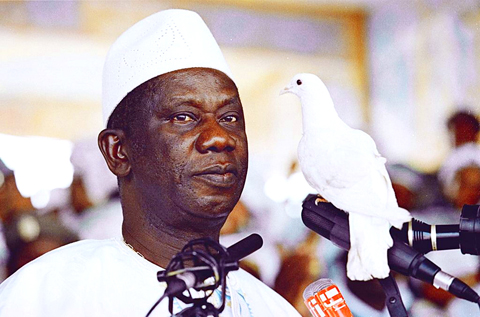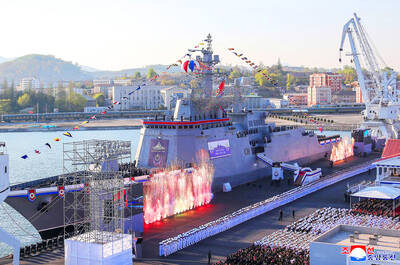Guinean President Lansana Conte, who had ruled the West African country with an iron hand since seizing power in a coup nearly a quarter century ago, has died following a lengthy illness, the National Assembly president said yesterday.
Aboubacar Sompare, flanked by the country’s prime minister and the head of the army, said on state-run TV that Conte had died on Monday evening.
He was believed to be in his 70s, but the government has never disclosed his birth date.

PHOTO: AFP
“I have the heavy duty of informing the people of Guinea of the death of General Lansana Conte following a long illness,” Sompare said. He did not provide a specific cause of death or elaborate on the type of illness.
Sompare said that for many years Conte “hid his physical suffering in order to give happiness to Guinea.”
‘BIG MEN’
Conte was one of the last members of a dwindling group of so-called “African Big Men” who came to power by the gun and resisted the democratic tide sweeping the continent.
He seized power in a military coup a week after the 1984 death of Ahmed Sekou Toure, Guinea’s first president after gaining independence from France in 1958. Conte’s official biography described the action as “an operation to safeguard and maintain peace in the country.”
Conte quickly established himself as the sole leader of the military junta. He abandoned Toure’s revolutionary socialist agenda, but like his predecessor, suppressed dissent.
As a post-Cold War democracy wave swept Africa, Conte formed a political party and in 1993 won the country’s first multi-party presidential election. He was re-elected in 1998 and 2003, though the opposition rejected the elections, protesting that they were flawed.
Guinea’s 10 million people are among the poorest in the world, even though the country holds half the world’s reserves of bauxite, the ore used to make aluminum. Guinea exported food at independence, but later had to begin importing food as the country became more impoverished, crippled by corruption, inflation and high unemployment.
Conte’s unpopularity was reflected in revolts by disgruntled soldiers and at least two attempts to oust him.
According to the Constitution, the head of the national assembly becomes president in the case of the death of the head of state. But transfers of power have rarely been smooth in Guinea, which has been crippled by corruption and rocked by multiple coups.
REACTIONS
Prime Minister Ahmed Tidiane Souare called on the army to secure the country’s borders, while Sompare directed the country’s courts to apply the law.
The two announcements, coupled by the presence of the head of the army, appeared to be an effort to signal that the government intended a peaceful transition.
Later yesterday, an army captain announced on state radio that the Constitution was suspended and the government and state institutions dissolved.
“The institutions of the republic have shown themselves to be incapable of resolving the crises which have been confronting the country,” Captain Moussa Dadis Camara said in an address on Radio Conakry.
“As of today, the Constitution is suspended as well as political and union activity,” he said. “The government and the institutions of the republic have been dissolved.”
A “consultative council” comprised of civilian and military representatives would be set up in their place.
Camara said the country was in a state of “deep despair” and it was vital that there was an upturn in the economy and more was done to combat corruption.
CHALLENGE
The most serious recent challenge to Conte’s rule came two years ago as demonstrators called for him to step down and Guinea descended into chaos.
Conte responded by declaring martial law and sent tanks into the capital streets. Security forces killed dozens of demonstrators.
Conte’s health and his undisclosed illness has been an issue of national debate for years. Rumors of his death surfaced periodically, including during the last election in 2003 when he was forced to go on TV to deny them.
“Everybody dies,” he told the nation. “Even the Prophet died. I will die when Allah wants me to.”
Similar rumors flared earlier this month when Conte failed to make his usual televised appearance on Tabaski, the name used in West African languages for Id al-Adha, a major Muslim holiday. The prime minister and others appeared in his place, but people were on edge and numerous businesses shuttered their doors to protect against possible unrest.
Last week, the editor of a local paper was arrested after publishing a picture of the frail leader struggling to stand up. A spokesman for the president went on TV to assure the nation that Conte was not ill.
The newspaper was ordered to print a photograph of Conte showing him in good health.

Archeologists in Peru on Thursday said they found the 5,000-year-old remains of a noblewoman at the sacred city of Caral, revealing the important role played by women in the oldest center of civilization in the Americas. “What has been discovered corresponds to a woman who apparently had elevated status, an elite woman,” archeologist David Palomino said. The mummy was found in Aspero, a sacred site within the city of Caral that was a garbage dump for more than 30 years until becoming an archeological site in the 1990s. Palomino said the carefully preserved remains, dating to 3,000BC, contained skin, part of the

TRUMP EFFECT: The win capped one of the most dramatic turnarounds in Canadian political history after the Conservatives had led the Liberals by more than 20 points Canadian Prime Minister Mark Carney yesterday pledged to win US President Donald Trump’s trade war after winning Canada’s election and leading his Liberal Party to another term in power. Following a campaign dominated by Trump’s tariffs and annexation threats, Carney promised to chart “a new path forward” in a world “fundamentally changed” by a US that is newly hostile to free trade. “We are over the shock of the American betrayal, but we should never forget the lessons,” said Carney, who led the central banks of Canada and the UK before entering politics earlier this year. “We will win this trade war and

‘BODIES EVERYWHERE’: The incident occurred at a Filipino festival celebrating an anti-colonial leader, with the driver described as a ‘lone suspect’ known to police Canadian police arrested a man on Saturday after a car plowed into a street party in the western Canadian city of Vancouver, killing a number of people. Authorities said the incident happened shortly after 8pm in Vancouver’s Sunset on Fraser neighborhood as members of the Filipino community gathered to celebrate Lapu Lapu Day. The festival, which commemorates a Filipino anti-colonial leader from the 16th century, falls this year on the weekend before Canada’s election. A 30-year-old local man was arrested at the scene, Vancouver police wrote on X. The driver was a “lone suspect” known to police, a police spokesperson told journalists at the

North Korean leader Kim Jong-un has unveiled a new naval destroyer, claiming it as a significant advancement toward his goal of expanding the operational range and preemptive strike capabilities of his nuclear-armed military, state media said yesterday. North Korea’s state-run Korean Central News Agency (KCNA) said Kim attended the launching ceremony for the 5,000-tonne warship on Friday at the western port of Nampo. Kim framed the arms buildup as a response to perceived threats from the US and its allies in Asia, who have been expanding joint military exercises amid rising tensions over the North’s nuclear program. He added that the acquisition